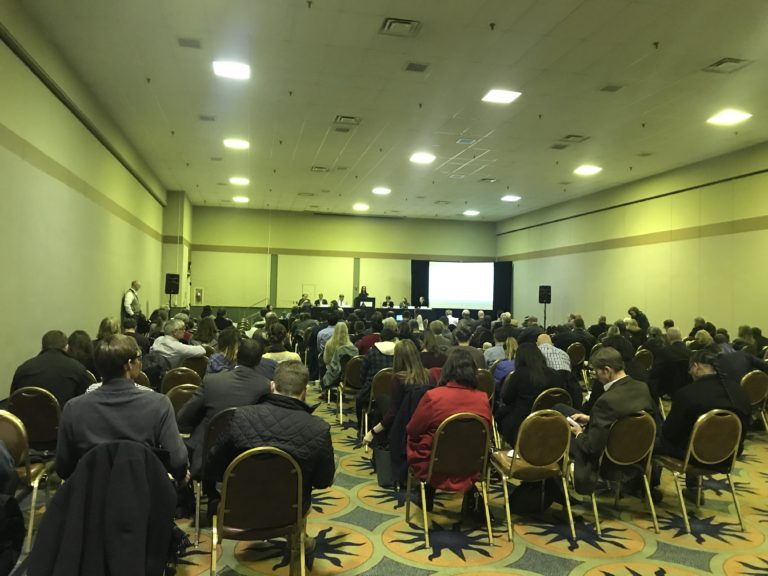Statement of Kansas Riverkeeper Dawn Buehler to EPA on Redefining Waters of the U.S.
By: Kansas Riverkeeper

Missouri Confluence Waterkeeper Rachel Bartels, Kansas Riverkeeper Dawn Buehler, and Lake Worth Waterkeeper Reinaldo Diaz braved icy roads to testify in Kansas City on Feb. 28 at the only hearing EPA is hosting on its proposed redefinition of Waters of the U.S., a change that would strip waters around the country of Clean Water Act protection.
Read comments by Dawn Buehler, the Kansas Riverkeeper, below:
I am a native Kansan, and a proud farmer’s daughter, born and raised on the banks of the Kansas River. I’m grateful that my work as Kansas Riverkeeper enables me to spend my days on the river, defending it from polluters. I’m also an active member of the Kansas Basin Regional Advisory Committee, working with people across Kansas to address our state’s water problems.
It’s safe to say that I might spend more time on the Kansas River than anyone else; the Clean Water Act is at the heart of much of my work.
The current proposal to strip some of our waterways of protection under the Clean Water Act would damage the water quality of our entire state. It would harm the Kansas River, a drinking water source for more than 800,000 Kansans.
There is clear scientific evidence of the importance of holistic watershed health and its benefits to the ecosystem and our drinking water supply. Protecting our drinking water requires us to protect all of our waterways.
The Kansas River watershed is 61,000 square miles, covering almost the entire upper half of Kansas, parts of eastern Colorado and central Nebraska. In the entire state of Kansas, there are more than 134,000 miles of streams and rivers, of which 110,000 are precipitation-fed intermittent streams, which would no longer be protected by the Clean Water Act under this new rule.
Wetlands provide a critical benefit to our waterways by acting as kidneys that improve water quality. Wetlands manage hydrology, reduce flood damage, and provide economic value to our communities that depend on clean drinking water. This proposal would strip some of our vital wetlands of Clean Water Act protection as well.
River networks are ecological corridors: They are complex systems that integrate hydrologic, geomorphologic, biological, and ecological dynamics.
The proposed rule would leave biologically connected parts of the watershed unprotected. Stripping Clean Water Act protection from intermittent streams would imperil the diverse aquatic invertebrates that depend on these streams, and, in turn, the fish and birds higher up the food chain. Stripping Clean Water Act protection from playa lakes and other wetlands would leave us more vulnerable to flooding and contaminated groundwater. It would imperil the ducks and geese that depend on these wetlands as they migrate.
This proposed rule comes at a time when the nation’s waters are already imperiled. Close to 70 percent of the waters assessed by EPA are already classified as “threatened” or “impaired.” The Kansas River is already impaired for total phosphorus for all 173 miles and E. coli for much of its length.
Federal regulations play an important role in the protection of our natural resources, especially our nation’s water. When are we going to make our entire watershed a priority? Watersheds know no political boundaries. We ask EPA to consider the science, the connection of the entire watershed, and its benefit to the Kansas River as a whole system.
*****
You can defend our waters by submitting comments about the proposal to gut the Clean Water Act below.
